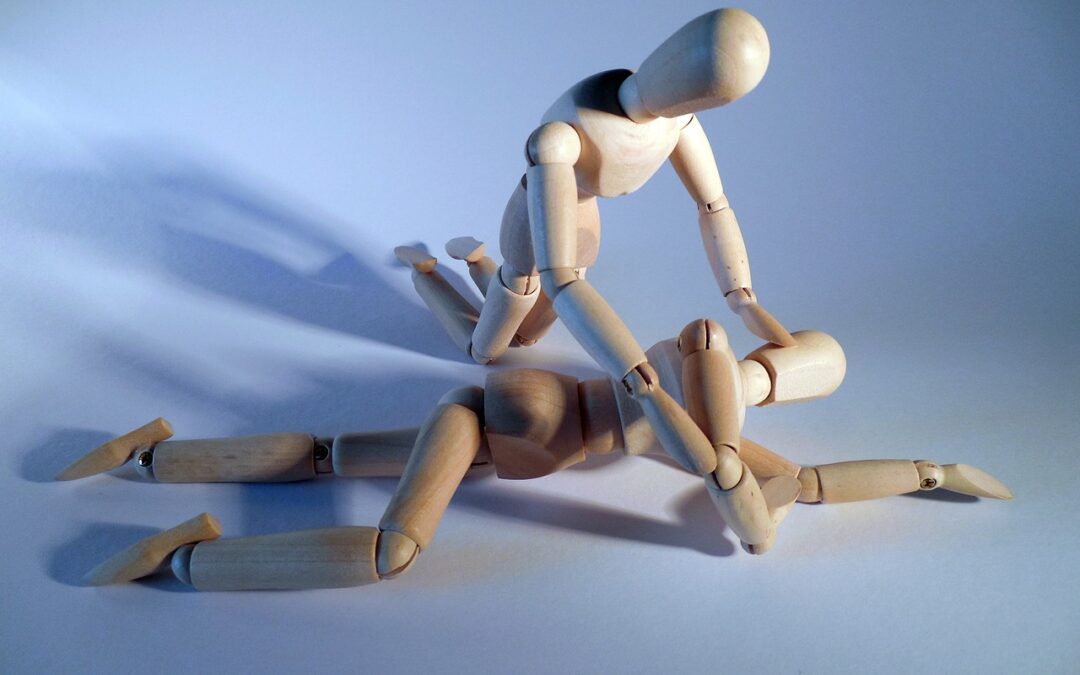Policing is a Strange Job. I was just walking into a restaurant to order lunch when I heard the call. “Woman not breathing.” Then I heard the address. Less than a mile away from me. I took a moment to pause. I’m in a specialty unit. I drive a patrol vehicle, and I wear a uniform. But I’m not dispatched to patrol calls. The unit enroute advises of their location. They are several miles away. I took a moment to decide. I’m going. I advise dispatch, leave the restaurant, and do that awkward half jog/half run to my vehicle.
Getting in, I flip my lights and sirens on and head the short distance to the house. As I round the corner, I see a young man on the phone in the front yard. He’s frantically waving me down. As I exit my car, the young man is gone, and the front door is open. I enter the home as I announce myself. I hear people beckoning from the end of a hall. I turn, enter the room, and there’s chaos is unfolding.
There’s a woman on the ground, and a younger female doing chest compressions. CPR can be exhausting. I have no idea how long she’s been at it. I advise dispatch that I’m starting CPR, secretly hoping it will motivate the next unit to drive a little faster. I move her aside and take over the compressions. “Oh, you can tell by the way I use my walk, I’m a woman’s man, no time to talk. Ah, Ah, Ah, Ah, saving a life. Saving a life.” I sing the song just under my breath to get my compressions at the right pace. Once I’ve developed the cadence, I start to count at barely a whisper. “One, two, three, four, five, six…” As I continue to count, I can hear things around me. Family members crying and sobbing. Frantic questions, irrational at times, like “who is watching the dogs?”
Observations start running through my mind. She’s warm, her body still soft. Her fingertips have stippling of discoloration, but not lividity. There’s no rigor. She’s warm. I stop compressions to try to get a pulse on her neck. But I can’t. And now I feel like I’m wasting time looking for it. I do lift her chin and tilt her head to give her airway the best chance it has. And I continue to whisper: “One, two, three, four, five, six…”
As I finish out my 4 set of 60 compressions, the fire department enters the room. One of them immediately taps me out and takes over compressions. The medic is in complete control. He’s barking out orders at everyone, but they all make sense, and everyone falls in together like a machine. They cut her shirt off and place a device on her chest that helps measure the effectiveness of the compressions. The EMT continues for 2 minutes, and then it’s my turn to jump in again. At 15 seconds he warns the others of the time left. At zero, he stops. They check for a pulse, and then I jump in again.
She’s warm. I can’t stop thinking about that. She’s warm enough that I’m convinced she’s going to start breathing and her heart will start beating on its own. She’s warm enough that this should be working. But it’s not. And I continue. “One, two, three, four, five, six…” I find myself grateful for the device they put on her. It shows me on a monitor how deep my compressions are, the pacing of them, and how much time I have left. In that moment I love that I can distract myself by focusing on numbers. To shallow, or too slow, and they turn yellow. As I get back on track, they turn green. I stay focused on keeping them green. And I watch the timer. Like the last period of school, the clock ticks slower than it should. 2 minutes feels like 5. My wrists hurt. My shoulders burn. My back aches. But I know I’m not stopping. I have less than a minute left. I can do anything for a minute. And that’s the first time I hear it. The husband in the other room yells “Don’t you stop. Don’t give up on her.” And I don’t. I continue.
3 more times will I get tapped out and tapped in. 3 more times will I perform compressions, focusing on those numbers and colors. Trying not to notice that she doesn’t feel as warm. Trying not to notice that the discoloration in the fingertips is more noticeable. Just focus on the compressions.
But slowly the medics are running out of options. They placed IV’s, they’ve pumped meds, they’ve check levels. There’s no trauma to be seen. No holes to plug. No injuries to patch. No one knows how long she’s been down. We’re running out of options.
As I watch another officer deliver his 2 minutes of compressions, 25 minutes after I arrived on scene, the word comes in. The hospital advises us to call it. It’s a hard decision, but it was simply a matter of time. As the medics call a stop to the activity, the room becomes quiet. You can see the disappointment in everyone’s eyes. We tried. We tried damn hard. But sometimes no amount of effort can stop the inevitable. They start to pic up medical trash. They cover her body with a sheet from the bed. They pack up their bags and cases. Everyone stares awkwardly because we know someone has to go tell the family.
An officer walks out to the kitchen to deliver the unthinkable. I can tell the very second the words leave his mouth. The entire family cries out at once. It’s chilling. It’s loud. And it’s painful. Amidst the cries and the anguish, there are yells of “No. Don’t stop. Don’t give up. Bring her back.” There are screams of “Don’t give up on her. Keep going.” And it cuts deep.
I will eventually come to terms with the fact that I did all I could. I left my lunch. I drove as fast as I could. I ran inside and immediately started CPR. I kept the numbers green. But in that moment. In that second of space and time. Hearing those words makes me feel useless and worthless. I’ve let the family down. On any given Wednesday, they have lost their wife, their mother, their loved one without warning or cause. And while I know they aren’t actually blaming us, when I hear their cries and calls to us, it certainly feels like it.
A few times, family members try to enter the bedroom where the body lies, filled with needles, and airways, and other medical devices. And each time I tell them the same thing: “You don’t want the memories that are in that room now. You want to keep the memories that you have previous to this.” They listen, and retreat back to the living room, where I can hear them crying, sobbing, and trying to console one another. As I stand in the hallway, I too wish I didn’t have to have the memories that are in that room.
I spent 25 minutes assisting in CPR. Going through the emotions, feelings, hope, and disappointment that it can bring. And for the next 25 minutes I stood awkwardly in a dark hallway, listing to the agony and grief of a family that was not prepared to lose their mother today. I spent that time second guessing my actions, trying not to break down with emotions, trying to maintain a professional composure, and wishing desperately to be anywhere else.
Eventually I was released. I walked back to my vehicle and drove out of the neighborhood. I felt a little empty. I felt drained. Unsure what to do, I returned to the restaurant I’d left earlier. Walking in, I entered the bathroom and washed my hands with the hottest water I could muster. Then I ordered and sat down.
Policing is a Strange Job.
Alone in my thoughts, I sat there. Unsure of what I should be thinking but thinking none the less. They brought out my kale and beet salad with steelhead trout, and I started to eat. Policing is a Strange Job.
I work in a very police friendly area. People constantly stop to talk to me when they see me. And today was no different. As I sat, eating my salad, and feeling like an empty shell, people passed my table and greeted me, thanked me for what I do, or walked their kids over to say hello. And it occurred to me….
Policing is a Strange Job.. One second, you’re doing 6 rounds of CPR on a person, unsuccessfully, as the family yells at you not to let their mother die. And the next minute you’re eating a kale and beet salad and acting like this is completely normal. Like we’re just supposed to switch our emotions on and off on a whim. It seems easier just to switch them off all the time. To be cold, uncaring, and machine like while at work. But that’s not who I am. I’m not apathetic. And I don’t think apathy has a place in my world. But I can’t keep them on all the time earlier. Because sobbing into a salad at work doesn’t look right either. So, I sit, I eat, and I say hi to passersby, as my mind is consumed in a hurricane of thoughts.
I’m sure some readers are thinking that this didn’t seem like an extraordinary ordeal. And maybe you’re right. I’ve been privy to several hundred death investigations in my career. I’ve watched 3 people actually die. Like, made eye contact at the moment the spark left the body. I’ve participated in death notifications. I’ve consoled grieving family. So I can’t tell you why this hit different. This was not a momentous trauma for me. But what it was, is another microtrauma that gets added to scale. Another small emotional cut that turns in to a scar. And that adds up.
As I progress in my career, I feel like the smaller traumas did more damage than the larger ones. Like the big incidents were so masked by adrenaline, cortisol, and norepinephrine that by the time it was over it left very little damage. But these small incidents. They place a burden on your humanity. And eventually your humanity runs out of real estate. They feel heavier each year. They hurt more. And they make me feel weakened.
A coworker that was on scene later asks me: “You good?” And what do I say? Do I say “Fuck no. That shit fucked me up man. That family crying and screaming? It’s echoing in my head still.” No. I say “I’m good.” I go home. I self-medicate with several glasses of whiskey and hope that I can sleep through the night. Because as self-aware as I’d like to think I am, I still don’t know the right answer to fix this. I just know what a weird fucking job this is. And that it wears me down, one small incident at a time. Policing is a Strange Job.

